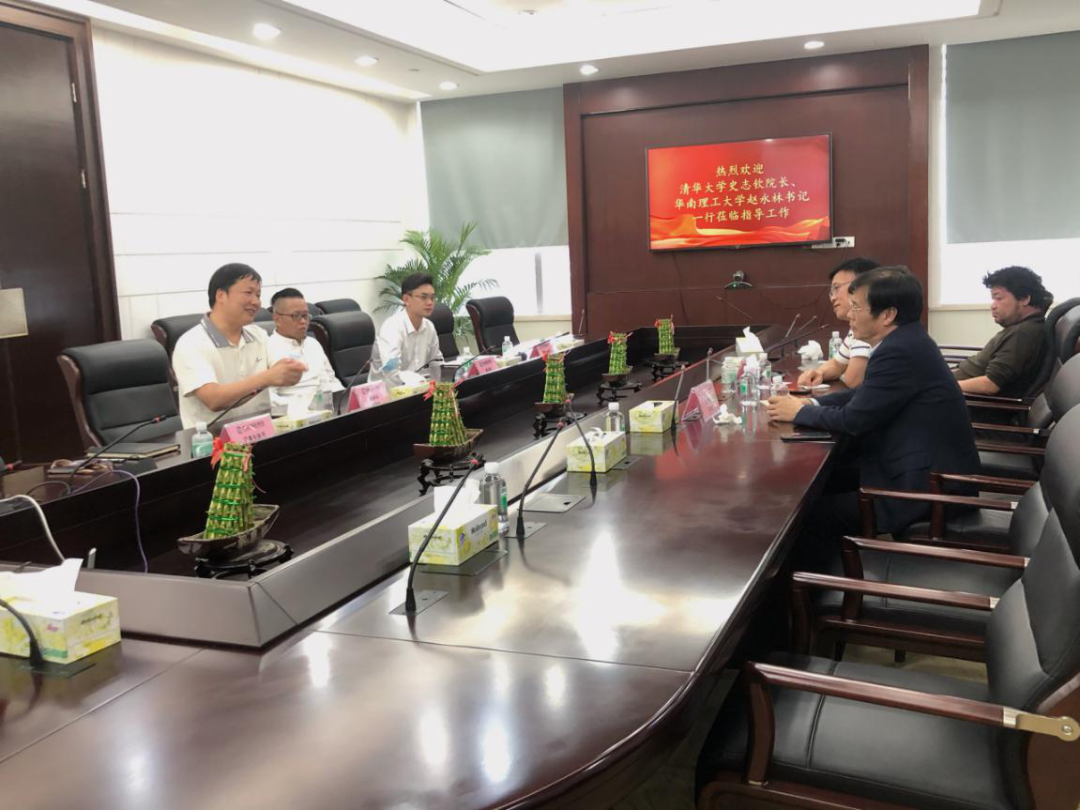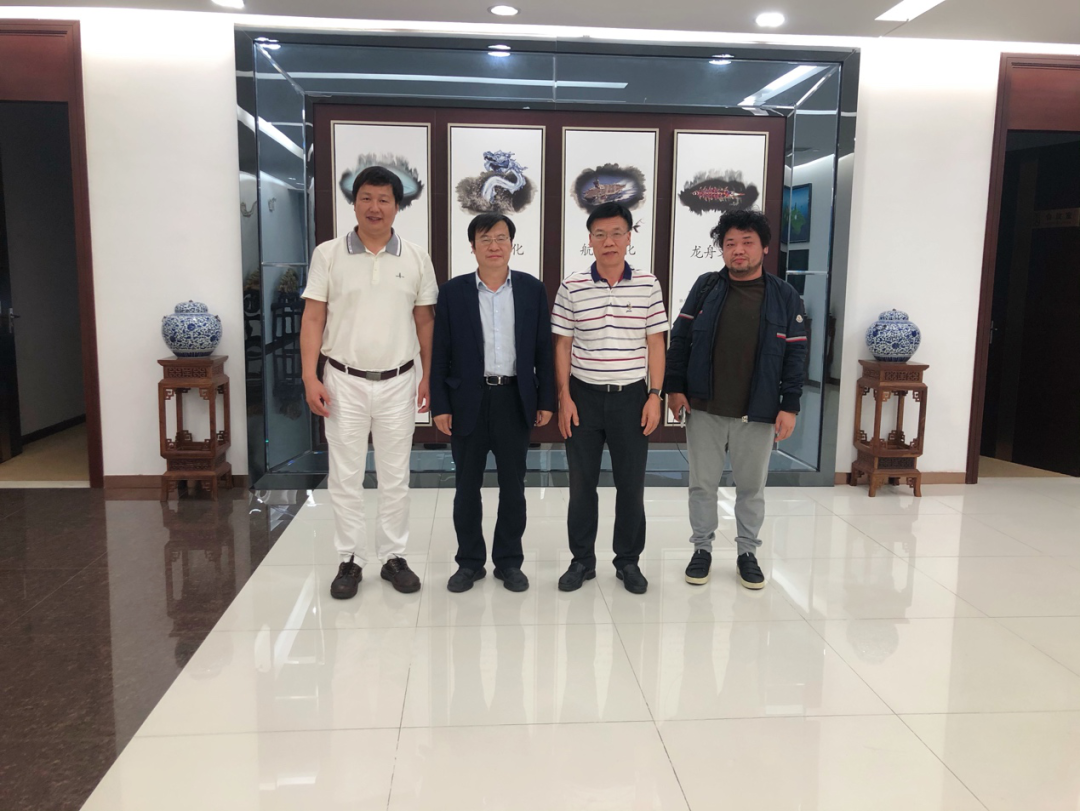Tsinghua University and South China University of Technology Visited Zhonglin
From:
Zhonglin International Group Date:10-26 1304 Belong to:Company Related
On the afternoon of October 23, 2020, Shi Zhiqin, Executive Dean of the "Belt and Road" Strategic Research School at Tsinghua University, and Zhao Yonglin, former Party Secretary of the School of Business Administration at South China University of Technology, visited Zhonglin International Group for business inspection. Senior leaders such as President Lin Jinmeng and Vice President Liu Dongkai attended the meeting, during which the group leaders gave a detailed report to the guests on the company's two major projects, namely Zhujin Life Science and Hydrogen Oil.

The Zhujin Life Science Project is based on the bamboo and wood boards, bamboo pulp and household paper, food, medicine, cosmetics, bamboo and gold extraction, bio aviation oil, bio based advanced lubricating oil-based oils, and fully utilizes branches, leaves, and residues to truly achieve "one gram of gold per bamboo" and form a sustainable bio based industry chain! As the world's largest bamboo producing country, China has a total bamboo forest area of 379.09 hectares and is known as the "second forest". Moreover, bamboo has a short growth cycle, fast maturation, easy regeneration, and strong regeneration ability: once afforestation is successful, it can be continuously managed and utilized. Zhonglin International plans to invest 20 billion yuan in the Guangdong Hong Kong Macao Greater Bay Area, Jiangxi, Guangxi, Hainan and other bamboo towns to build 20 bamboo and gold life science industry bases, with an annual processing capacity of 2 million tons of bamboo, achieving a production value of 100 billion yuan and a tax revenue of 10 billion yuan, transforming the bamboo sea into an oil field, effectively driving local farmers out of poverty and revitalizing the local economy. By forming a new collective economic model with local bamboo farmers, including bamboo and gold cooperatives, state-owned assets, private assets, and funds, we aim to achieve poverty alleviation through science and technology, as well as the revitalization of the local economy Targeted poverty alleviation, leading millions of farmers in old areas to lift themselves out of poverty and become prosperous, and winning the battle against poverty.
The Hydrogen Oil Project is built and expanded with the Greater Bay Area as its core, focusing on exploring the field of organic hydrogen storage at room temperature and pressure, and based on sustainable social development. By continuously improving and innovating technology, hydrogen projects can achieve maximum environmental friendliness, efficiency, and resource utilization. The National Energy Hydrogen Oil Project can not only improve the human living environment, but also alleviate the increasingly severe environmental and ecological pressure; In the future, it can also solve China's energy security issues and achieve green and safe economic supply of hydrogen energy.
Through in-depth understanding, Secretary Zhao lamented the value that a bamboo can create and expressed support for us to continue deepening our efforts in the field and strive for greater progress. President Shi also provided suggestions on this project, which benefits the country and the people, from the perspective of project scientificity, national sustainable development, and national security considerations.


The Zhujin Life Science Project is based on the bamboo and wood boards, bamboo pulp and household paper, food, medicine, cosmetics, bamboo and gold extraction, bio aviation oil, bio based advanced lubricating oil-based oils, and fully utilizes branches, leaves, and residues to truly achieve "one gram of gold per bamboo" and form a sustainable bio based industry chain! As the world's largest bamboo producing country, China has a total bamboo forest area of 379.09 hectares and is known as the "second forest". Moreover, bamboo has a short growth cycle, fast maturation, easy regeneration, and strong regeneration ability: once afforestation is successful, it can be continuously managed and utilized. Zhonglin International plans to invest 20 billion yuan in the Guangdong Hong Kong Macao Greater Bay Area, Jiangxi, Guangxi, Hainan and other bamboo towns to build 20 bamboo and gold life science industry bases, with an annual processing capacity of 2 million tons of bamboo, achieving a production value of 100 billion yuan and a tax revenue of 10 billion yuan, transforming the bamboo sea into an oil field, effectively driving local farmers out of poverty and revitalizing the local economy. By forming a new collective economic model with local bamboo farmers, including bamboo and gold cooperatives, state-owned assets, private assets, and funds, we aim to achieve poverty alleviation through science and technology, as well as the revitalization of the local economy Targeted poverty alleviation, leading millions of farmers in old areas to lift themselves out of poverty and become prosperous, and winning the battle against poverty.
The Hydrogen Oil Project is built and expanded with the Greater Bay Area as its core, focusing on exploring the field of organic hydrogen storage at room temperature and pressure, and based on sustainable social development. By continuously improving and innovating technology, hydrogen projects can achieve maximum environmental friendliness, efficiency, and resource utilization. The National Energy Hydrogen Oil Project can not only improve the human living environment, but also alleviate the increasingly severe environmental and ecological pressure; In the future, it can also solve China's energy security issues and achieve green and safe economic supply of hydrogen energy.
Through in-depth understanding, Secretary Zhao lamented the value that a bamboo can create and expressed support for us to continue deepening our efforts in the field and strive for greater progress. President Shi also provided suggestions on this project, which benefits the country and the people, from the perspective of project scientificity, national sustainable development, and national security considerations.




